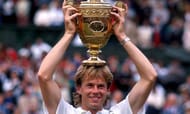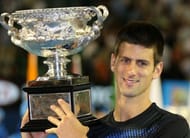For the first few years in the Open Era, the Australian Open suffered from the lack of participation by top-ranked players due to its general geographical isolation and the inconvenient scheduling of the event. It was too close to the Christmas / New Year holiday period, and many stars chose to skip it.
Things looked to have taken a turn in the right direction when future No. 1 Jimmy Connors made his Grand Slam breakthrough Down Under in 1974. But it would be almost a decade before the Australian Open became a true global event, when the likes of Ivan Lendl, Mats Wilander and John McEnroe landed on Australian shores in 1983.
This necessitated the shifting of the tournament to a bigger arena for catering to the increased inflow of players and spectators alike. A year after shifting to Melbourne Park Arena in 1987, the tournament transitioned to hardcourt - after being contested on grass for eight decades.
Of the 54 players in the Open Era to have won a Grand Slam title, Novak Djokovic (7) and Roger Federer (6) lead a group of 26 players to have triumphed in Melbourne. 11 players have made their Grand Slam breakthrough at the Australian Open.
On that note, let us meet the last 5 players to have done so at the first Grand Slam tournament on the tennis calendar.
#5 Stefan Edberg - 1985

The only player to win the junior calendar-year Grand Slam (1983), Stefan Edberg arrived at the 1985 Australian Open fresh off winning the gold medal at the 1984 Olympic games in Los Angeles.
Making his third appearance at the Australian Open, and 8th overall at a Grand Slam tournament, Edberg beat John Lloyd in straight sets in the quarterfinal. He then recovered from a two sets to one deficit in the semifinal before downing Ivan Lendl 9-7 in the fifth set.
In the title clash against two-time defending champion and fellow countryman Mats Wilander, Edberg took the first two sets to assume cruise control of the contest. Refusing to relinquish his ascendancy in the match, two breaks followed in the third set as Edberg ended the two-year Australian Open reign of his countryman.
In the process, the then 19-year-old became only the second teenager in the Open Era to triumph at the Australian Open, and the 24th player to lift a Grand Slam title.
You may also like: 3 youngest players to have won the Australian Open
#4 Petr Korda - 1998

After going down to American Jim Courier in straight sets in his maiden Grand Slam final at Roland Garros 1992, Petr Korda made his second Grand Slam final at the 1998 Australian Open.
Contesting the first all-lefty Grand Slam final since John McEnroe beat Jimmy Connors at 1984 Wimbledon, Korda took on Marcelo Rios of Chile. Rios holds the rather ignominious record of being the only World No. 1 never to have won a Grand Slam title; this would be Rios' first and last opportunity to do so.
The final itself between the two left-handers turned out to be rather dull. Korda beat Rios for the loss of two games in each set, for the most lopsided Grand Slam final since the 1991 US Open (where Stefan Edberg beat Jim Courier 6-4, 6-2, 6-0).
With the win, the then 31-year-old Korda ascended to a career-high of World No. 2, in the process becoming the fifth oldest player to make his Grand Slam breakthrough.
You may also like: 3 players who took the longest to make their Grand Slam breakthrough
#3 Thomas Johansson - 2002

Sweden's decade-long wait for a men's singles Grand Slam champion was brought to an end by the unlikely triumph of Thomas Johansson at the 2002 Australian Open.
The weight of Swedish expectations for a Grand Slam champion had downed many a good Swedish player since Stefan Edberg won the 1992 US Open. Thomas Enqvist faltered in the 1999 Australian Open final against Yevgeny Kafelnikov, and Magnus Norman fell short in the 2000 Roland Garros final against Gustavo Kuerten.
For a player who never made it past the Australian Open third round in seven previous appearances at the tournament, Johansson exceeded expectations merely by reaching the second week in Melbourne that Australian summer. But the fortnight was to get better still for the Swede.
Johansson overcame Romania's Adrian Boinea in the fourth round and fellow countryman Jonas Bjorkman in the quarterfinals to reach his first Major semifinal, where Czech Jiri Novak lay in wait.
After taking the first set on a tiebreak, Johansson spectacularly unraveled in the next two sets as he won a combined four games. But the Swede regrouped in time, claiming a hard-fought five-set win with his fourth match point to reach his maiden Major final.
In a competitive title match against 2000 US Open winner Marat Safin, Johansson lost his serve twice in the opening set as the tall Russian took a one-set lead. Thereafter Johansson took control of the contest, as Safin ceded the initiative to his inspired opponent.
Johansson's backhand and return of serve coupled with the seemingly disinterested Safin's flurry of unforced errors meant that the former became the first 16th seed to win a Grand Slam tournament. He was also the lowest-ranked player to win a Major since 66th ranked Gustavo Kuerten's triumph at Roland Garros 1997.
As a result of his Grand Slam breakthrough, Johansson broke into the top 10 of the world rankings for the first time.
You may also like: 5 lowest-ranked men's singles champions at the Australian Open
#2 Novak Djokovic - 2008

Four months after being thwarted in his maiden Grand Slam final by Roger Federer at the 2007 US Open, Novak Djokovic exacted revenge by dethroning the two-time defending champion in the 2008 Australian Open semifinals - to book a title showdown with Jo-Wilfried Tsonga.
In a clash between two men looking for their first Major title, it was the Frenchman who made the stronger start. Following an early exchange of serves, the match settled down into a baseline slugfest.
Djokovic lost his serve for the second time in the set to drop the opener, but Tsonga failed to ride his momentum in the second set as the Serb restored parity.
The Serb then underlined his ascendancy in the contest by taking the third set to move to within a set of his first Grand Slam title. At 5-6 in a competitive second set, Tsonga ignored an open court at his mercy to squander his lone set point of the set.
Djokovic overcame the momentary lapse to streak across the finish line, in the process becoming the first Serbian player and the 50th overall to lift a Grand Slam title in the Open Era.
You may also like: Re-living Djokovic's 7 title triumphs at the Australian Open
#1: Stan Wawrinka - 2014

Having made a trio of quarterfinals earlier, Stan Wawrinka made his Grand Slam breakthrough at the 36th time of asking at the 2014 Australian Open.
The 'other Swiss' dethroned three-time defending champion Novak Djokovic in a five-set quarterfinal before taking out Tomas Berdych in a four-set semifinal featuring three tiebreaks.
The imposing figure of 13-time Grand Slam winner Rafael Nadal stood between Wawrinka and a maiden Grand Slam title. Nadal had not dropped a set against Wawrinka in 12 previous meetings, and hadn't lost to a first-time Grand Slam finalist in 3 previous matchups (2005 French Open: beat Mariano Puerta, 2010 Wimbledon: beat Tomas Berdych, 2013 French Open: beat David Ferrer).
But both stats would change on a day Wawrinka belied overwhelming odds and exhibited little stage fright in the biggest match of his career. Blazing his laser-like single-handed backhand to devastating effect, Wawrinka punctured Nadal's baseline game to take a two-set lead for the loss of just five games.
With a swift ending in sight exacerbated by Nadal's injury at the end of the second set, the Spaniard drew inspiration from the crowd. He stopped the rot and took the third set, much against the run of play.
Stung by the momentary lapse, Wawrinka soon re-asserted his momentum to become the 53rd different player in the Open Era to win a Grand Slam title, and the 26th different player (Nadal being the 25th) to reign at the Australian Open. The Swiss' breakthrough came in his 36th appearance at a Major.
You may also like: 4 tournaments where Nadal has had the most missed opportunities
How did Novak Djokovic meet Jelena Ristic? All about the most admired couples in tennis
